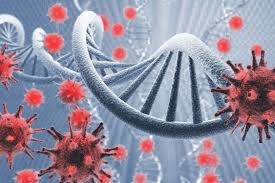HIV News: American And Australian Scientists Discover That A HIV Protein Nef Causes Permanent Changes To Immune Cells, Leading To Chronic Inflammation!
HIV News - Chronic Inflammation Nov 23, 2022 3 years, 3 weeks, 4 days, 16 hours, 28 minutes ago
HIV News: A new study by researchers from The George Washington University - USA, University of Melbourne - Australia and Massachusetts General Hospital, Harvard Medical School, Boston – USA have found that a HIV protein called Nef causes permanent changes to immune cells, leading to chronic inflammation and associated co-morbidities including cardiovascular issues.

According to the study team, a possible explanation for chronic inflammation in HIV-infected individuals treated with anti-retroviral therapy is hyperreactivity of myeloid cells due to a phenomenon called “trained immunity.”
The study team demonstrated that human monocyte-derived macrophages originating from monocytes initially treated with extracellular vesicles containing HIV-1 protein Nef (exNef), but differentiating in the absence of exNef, release increased levels of pro-inflammatory cytokines after lipopolysaccharide stimulation.
Importantly, this effect is associated with chromatin changes at the genes involved in inflammation and cholesterol metabolism pathways and upregulation of the lipid rafts and is blocked by methyl-β-cyclodextrin, statin, and an inhibitor of the lipid raft-associated receptor IGF1R.
It was found that bone-marrow-derived macrophages from exNef-injected mice, as well as from mice transplanted with bone marrow from exNef-injected animals, produce elevated levels of tumor necrosis factor α (TNF-α) upon stimulation. These phenomena are consistent with exNef-induced trained immunity that may contribute to persistent inflammation and associated co-morbidities in HIV-infected individuals with undetectable HIV load.
The study findings were published in the peer reviewed journal: Cell Reports.
https://www.cell.com/cell-reports/fulltext/S2211-1247(22)01548-0
It should be noted that although antiretroviral therapy has made HIV a manageable disease, most individuals living with HIV often suffer from chronic inflammation. This can put them at an increased risk of developing comorbidities such as cardiovascular disease and neurocognitive dysfunction, impacting the longevity and quality of their lives.
Numerous past
HIV News coverages have already covered how HIV patients even with controlled viral loads and healthy CD4 levels still succumb to increased risk of mortality due to heart issues and even organ failures due to chromic inflammation.
The study findings provide an explanation as to why chronic inflammation may be happening and how suppression or even eradication of HIV in the body may not resolve it.
The study team showed how an HIV protein permanently alters immune cells in a way that causes them to overreact to other pathogens. When the protein is introduced to immune cells, genes in those cells associated with inflammation turn on, or become expressed, the study showed. These pro-inflammatory genes remain expressed, even when the HIV protein is no longer in the cells.
The study team said that this "immunologic memory" of the original HIV infection is
why individuals living with HIV are susceptible to prolonged inflammation, putting them at greater risk for developing cardiovascular disease and other comorbidities.
Importantly, the study findings highlight the importance of doctors and patients recognizing that suppressing or even eliminating HIV does not eliminate the risk of these dangerous comorbidities.
.jpg) Graphical Abstract
Graphical Abstract
Lead researcher, Dr Michael Bukrinsky, a professor of microbiology, immunology, and tropical medicine at George Washington's School of Medicine and Health Science told Thailand Medical News, “Both HIV patients and their doctors should still discuss ways to reduce inflammation and researchers should continue pursuing potential therapeutic targets that can reduce inflammation and co-morbidities in HIV-infected patients.”
In the research, the study team isolated human immune cells in vitro and exposed them to the HIV protein Nef. The amount of Nef introduced to the cells is similar to the amount found in about half of HIV-infected individuals taking antiretrovirals whose HIV load is undetectable.
The study team, after a period of time, introduced a bacterial toxin to generate an immune response from the Nef-exposed cells.
Interestingly, compared to cells that were not exposed to the HIV protein, the Nef-exposed cells produced an elevated level of inflammatory proteins, called cytokines.
Upon the study team comparing the genes of the Nef-exposed cells with the genes of the cells not exposed to Nef, they identified pro-inflammatory genes that were in a ready-to-be-expressed status as a result of the Nef exposure.
The study tea said that the findings in this study could help explain why certain comorbidities persist following other viral infections, including COVID-19.
Dr Bukrinsky explained, “We've seen this pro-inflammatory immunologic memory reported with other pathogenic agents and often referred to as 'trained immunity’. While this 'trained immunity' evolved as a beneficial immune process to protect against new infections, in certain cases it may lead to pathological outcomes. The ultimate effect depends on the length of this memory, and extended memory may underlie long-lived inflammatory conditions like we see in HIV infection or long COVID."
The key findings of the study were:
-ExNef-treated monocytes differentiate into MDM (monocyte-derived macrophages) hyperresponsive to inflammation
-Mice injected with exNef acquire long-lived pro-inflammatory memory in BMDMs (bone-marrow-derived macrophages)
-ExNef-induced training depends on glycolysis and cholesterol biosynthesis
-Lipid rafts are essential for exNef-induced trained immunity
For the latest
HIV News, keep on logging to Thailand Medical News.

.jpg)